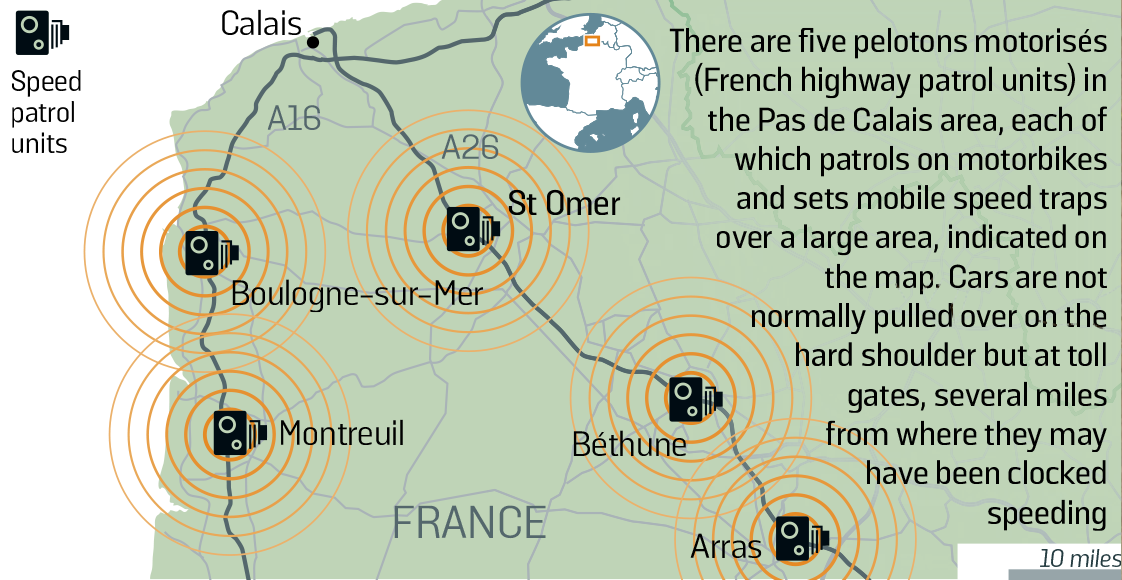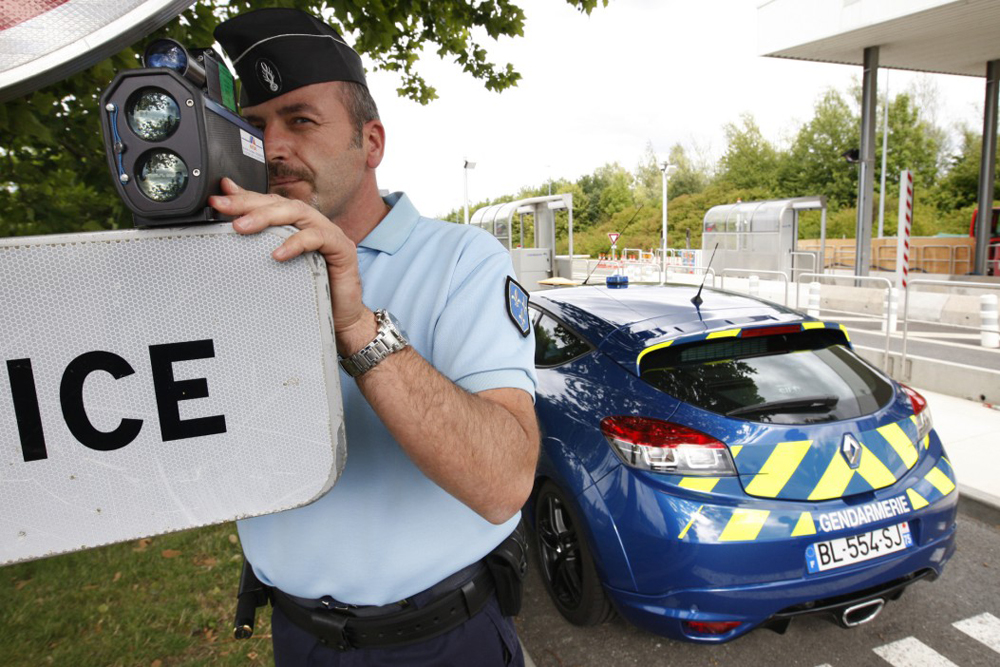British holidaymakers warned as France cracks down on speeders
It’s your money or your licence: France welcomes rosbif drivers
IT’S 4.03PM on the A16 autoroute, which runs between the outskirts of Paris and Dunkirk, via Calais. Standing next to a British-registered Audi TT is a man with shoulders hunched like a schoolboy, receiving a dressing-down from a French traffic officer.
He is being asked to hand over his driving licence — which he does. It will be posted back to him, but not for weeks, and in the meantime he is told he is banned from getting back behind the wheel in France for three days. As he makes his apologies, his wife is sent to a nearby cash machine — accompanied by a policeman — to get the money to pay a €135 (£108) on-the-spot fine.
Search for and buy your next car at driving.co.uk
Welcome to speedy justice, French style. The driver has been clocked with a laser gun by a crack team of gendarmes out to catch British drivers who forget that France is not a playground. At 179kph (111mph), on an autoroute with a 130kph (81mph) limit he was lucky not to have his car seized, the authorities say. They are gearing up for a bumper summer as the annual exodus of holidaymakers begins and drivers head for holiday homes and campsites on the south and west coast of France.
This strict enforcement of speed limits is all about safety, of course, but it also yields big dividends. Unlike their British counterparts, the police in northern France use on-the-spot fines as their main weapon. Armed with laser guns and concealed under motorway bridges and in roadside hedges, they are catching more British drivers than any other west Europeans.
Armed with laser guns and concealed under motorway bridges and in roadside hedges, they are catching more British drivers than any other west Europeans.
More than 1m British holidaymakers are expected to be driving into France this summer, mainly through Calais and down the A16, or the other major route south, the A26, and French police predict they will collect a total of €1.73bn (£1.38bn) in speeding fines in 2014, up from €1.66bn last year.
In Britain, police generally give motorists some leeway above the speed limit before they are stopped. The pelotons motorisés — the name for the traffic gendarme units — stop drivers even if they edge above the speed limit by 1kph. Neither are drivers given the courtesy of being warned that they are entering a zone where speed traps are in operation on the routes that radiate from the ferry ports and Eurotunnel. The pelotons motorisés have taken to examining the manifests of trains and ferries, checking for high-powered sports cars that they suspect might be more prone to speeding, and deploying squads of officers to target them.
Once a car has been clocked above the speed limit there is no requirement for photographic evidence; if the policeman says the car was speeding, it is up to the driver to prove he was not. Justice, when it comes is summary and swift: as well as on-the-spot fines, drivers can receive an instant ban.

While the gendarmes insist they have no special remit to catch British drivers, they point out the temptation for Brits to take advantage of the long, straight roads in France that are relatively uncongested. Added to that is the surge in popularity of organised rallies whose participants can sometimes forget that strict limits apply, even though organisers don’t condone law-breaking.
Known as rallyes sauvages (or wild rallies) in France, these events typically follow public roads towards the sun and sea in southern Europe. They attract wealthy, speed-loving owners of rare supercars. In 2006, police seized a Ferrari 360 and Porsche 911 for the offence of reckless driving. The two drivers, both British, were travelling at more than 150mph during that year’s Cannonball Run. At a subsequent court hearing, the cars were permanently confiscated and auctioned off. The Ferrari owner bought back his car for €88,000 (then £60,000).
Sharing intelligence with Kent Police, the gendarmes now scour lists of cars booked onto Channel Tunnel trains or ferries, on the lookout for a telltale cavalcade of fast cars. “They know we react quickly and so they have started trying to cross during the evenings, at night, or around midday [when many French police officers go home for lunch],” says Captain Jean-Claude Derudder, second in command of the road safety department in the Pas de Calais region. “That doesn’t stop us from setting up speed checks quickly.”
Buying tickets for the Channel crossing at the last minute won’t help. “We only need 20 minutes to set up a speed check,” says Derudder. As it takes at least 30 minutes to cross the Channel, we have plenty of time.”
Officers have the power to seize cars for speeding alone. A staggered series of penalties was introduced in 2006, beginning with on-the-spot fines and moving on to an instant driving ban if drivers were caught at more than 40kph over the speed limit. Motorists speeding by more than 50kph over the limit could have their cars seized. It was a fate suffered by a Ferrari F355 owner last Sunday evening. Caught travelling at 191kph (119mph), the driver from London was forced to make his own way home after paying a €750 court deposit.
“In the past, people just raced through France at 200kph with wads of cash in their pocket. That has stopped since the rules changed because they know that they will lose their car.”
It is not just supercar owners who are being caught in the clampdown. Ordinary British holidaymakers are easy prey for the gendarmes.
Last Monday,we crossed the Channel to witness the French tactics as officers prepared for the summer by setting a trap for British spectators returning from the weekend’s Le Mans 24-hour race.
Yves Renard (his surname means “fox”) and his colleague Gerard Andrieux head to a discreet spot underneath a bridge, five miles from the autoroute’s final toll booth before Calais. Renard points the radar gun at oncoming traffic and reads out the speed of any car breaking the 130kph limit. Andrieux picks up his mobile phone and passes the details to his colleagues lying in wait at the toll booth. The first time most drivers know they are in trouble is when the toll barrier lifts and they are directed to pull over in the lay-by.
“In the past, people just raced through France at 200kph with wads of cash in their pocket, paid the fines at the roadside and then carried on,” says traffic officer François Maquinghen. “But that has stopped since the rules changed because they know that they will lose their car.”
“If you are going at 131kph you could be stopped,” says Maquinghen. “We are tougher at some points on some routes where there have been a lot of accidents. At others, you might not get stopped unless you are going faster than 150kph.”
It isn’t long before a British driver is caught. Joe Adams, 24, an engineer from Dartford, Kent, is caught travelling at 150kph in his Lexus GS and is handed a €45 fine. “I don’t recall speeding and I didn’t see the speed gun,” he says. “They’re not as visible as in Britain.”
Without enough cash to pay the fine — police accept only euros or French cheques — Adams has to hand his passport to the gendarme and drive to the nearest cash machine, then return to pay the fine.
Matthew Yates, clocked at a similar speed in his Maserati GranSport, accuses the police of using speed traps as revenue-raisers. “Doing 151kph on a wide, clear 130kph road is nothing,” says the 43-year-old from Chichester, who organises events for fellow Maserati owners. “And the €45 fine isn’t too bad.
“But they don’t seem to stop the French. There were French cars overtaking me but I’m the one who’s been stopped. We know it’s only for the money and I’ve come to expect it.”
In three hours at the roadside we notice only one French car being stopped and six British, but the police insist that they take no notice of where a car is registered. They just want to stop drivers who are travelling at dangerous speeds.
That said, the gendarmes think that dealing with British drivers is a pleasure. “They are very polite, they don’t argue and they always pay,” says Mégane Painset, a three-year veteran of the highway patrol. “Usually the excuse is that they were late for their ferry. But they still have to pay.”
There’s only one problem in the gendarmes’ eyes, though: they are still unable to access drivers’ details from a registration plate alone. Which means the hundreds of speed cameras across the motorway network are virtually useless in catching speeding British drivers. That is about to change. As revealed last month in Driving, a new law being drawn up by the European Commission will allow French police to track down British drivers from next May. And then there really will be no escape for British speeders.
For a comprehensive guide to the rules of the road in France, click here.
Search for and buy your next car at driving.co.uk
French speeding fines clarified
French penalties depend on the speed drivers were travelling when they exceeded the limit. In urban areas, fines are set at €90 for 1-39kph above the 50kph limit. On faster roads, including autoroutes, these apply:
1-19kph (up to 12mph) over limit
€45 (£36) on-the-spot fine.
20-39kph (12-24mph) over limit
€90 (£72) on-the-spot fine.
40-49kph (25-30mph) over limit
€135 (£108) court deposit and instant three-day driving ban in France only. This is followed by a court case, often several months later, when the ban could be extended for up to three years (two or three months is typical). The court retains the deposit as a fine unless the driver successfully argues it was wrongly imposed.
More than 50kph over limit (31mph-plus)
€750 (£600) court deposit and car impounded. This is followed by a court case. If the motorist is deemed to have been driving dangerously, their car can be permanently confiscated. The court can retain the deposit and increase the fine to €1,500, or €3,000 for repeat offenders.
Gumballer up a gum tree
When you hit the wide stretches of tarmac heading into open French countryside, it can be tough to resist the temptation of hitting the accelerator. That’s why the speed traps were waiting yesterday when drivers in the Modball rally from London to Ibiza crossed into France. They were also there two weeks ago for the Gumball rally when Xzibit, the rap star, was pulled over for driving at 198kph (123mph). It is thought that police could not seize the Bentley Continental GT he was driving because he didn’t own it, but he was ordered to pay €750. “After all of this, the cops wanted to take selfies,” he wrote.
Another favourite target of police is the Cannonball Run, which sees wealthy sports car owners charge across the Continent from five-star hotel to beach party and back again. Most of those who take part may be law-abiding but some wealthy owners aren’t deterred by fines.
“The old Cannonball Run was notorious,” says Captain Jean-Marc Delacuisine, who commands the peloton motorisé in Boulogne-sur-Mer, 20 miles from Calais. “People were coming through at 230kph [143mph] and driving recklessly by weaving through traffic. It was dangerous for the drivers and dangerous for everyone else too.
“During one event, I hid behind a tree at a motorway services on the A26 with a laser gun. The drivers weren’t stopped for another 50km [30 miles], so that they couldn’t alert [other] cars.”
Clarkson: we were left marooned and penniless at the roadside
You may not believe this but for the past 25 years I have had a clean driving licence. However, just as Gordon Ramsay must occasionally burn his meat and Monty Don must sometimes kill his parsley, I was bound to slip up one day. The trouble is that when it happened, I was in France — a country that has completely lost its sense of humour about speeding.
I was in an Aston Martin Vanquish. Just behind was Richard Hammond in a Porsche GT3. We were on our way to film the last sequence for last year’s annual Top Gear DVD. The sun was shining. Traffic was light. And all was well. But sadly we were being monitored by a crack new anti-speeding division of the French police. And as we reached the toll booth, they pounced.
I had been doing 141kph. Hammond had been tagged at 143. Which didn’t sound so bad. Even 143 is only 13kph above the French motorway speed limit. And that’s just 8mph. We therefore held out our wrists for a light slap.
But it turned out that the stretch of motorway we had been using was subject to a 90kph speed limit. You would be well advised to pay attention to what happened next. Because the on-the-spot fine was everything we had in our wallets. We were left penniless. And then they took away our driving licences. No court case. No arguing. Nothing.
This meant we were left at the side of the motorway with not a penny and no way of driving the Aston and the Porsche. This wasn’t the end of the world for us because the film crew came to the rescue, but if you are travelling alone, you are properly stuffed.
We subsequently learnt we would not be allowed to drive in France for three months.
Top tip: if you are going to break the speed limit, make sure you’re not in France.





